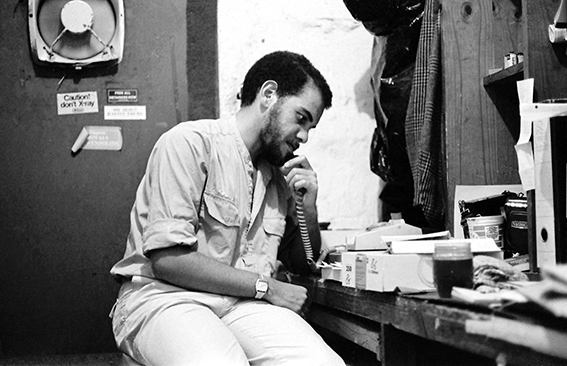
- This event has passed.
Rafs Mayet Artist Talk

Rafs Mayet, Cedric Nunn at Afrapix darkroom, circa 1985
Born and raised in the vibrant Warwick Triangle, Rafs Mayet attended Melbourne Primary and Umbilo High Schools. After matriculating, he embarked on a varied career path, exploring roles as a burner/welder in shipyards, a computer operator, a trainee electrician at SASOL, a roadie for various bands, and a program producer for Treasure Tshabalala at Capital Radio. In 1983, Mayet found his true calling in photography, learning the craft under the mentorship of Omar Badsha in his darkroom.
After marrying, Mayet relocated to East London, where he worked as a computer operator and trainee storeman at CDA, a manufacturer for Mercedes-Benz and Honda, for approximately eight months. He then transitioned to the darkroom at the local newspaper, the Daily Dispatch—affectionately nicknamed “the Daily Disgrace” by locals.
By the end of the 1980s, Mayet moved to Johannesburg, where he managed Kippie’s Jazz Club for eight months and later joined the Afrapix photographic collective. Upon returning to Durban, he became a photographer for the alternative newspaper The New African, leaving on the historic day that Nelson Mandela was released from prison—a moment he humorously refers to as his own liberation. Since then, Mayet has embraced the freelance lifestyle, which he aptly describes as a euphemism for being “unemployable” due to the unpredictability of creative work.
As a member of Afrapix, Mayet participated in numerous group exhibitions both locally and internationally, including the Zabalaza Festival in London and the Photo Biennale in Mali, Rotterdam, France, Japan, and more. His passion for music led him to focus on capturing musicians on film following the dawn of democracy in 1994, resulting in an extensive collection that he is currently organizing and archiving.
Notably, Mayet was the first to exhibit at the Cape Town International Jazz Festival in 1999 and went on to curate and coordinate the Duotone Gallery, a segment of the festival, for 15 years. His work is included in the South African National Gallery in Cape Town, the Durban Art Gallery collection, and various private collections worldwide.
While he still takes photographs occasionally, Mayet acknowledges a decline in work due to the rise of cell phone cameras. Nowadays, he cherishes time spent with his grandchildren and immerses himself in books, continuing the legacy of his father, Ike Mayet, who founded “Ike’s Books” over 35 years ago with Professor Vishnu Padayachee.
African Documentary Photography Archive Initiative (ADPAI)
ADPAI is a project of Art for Humanity, hosted at the Faculty of Art and Design, Durban University of Technology (DUT). The project exists to meet the overwhelming need to digitize and make available the images of African documentary photographers, especially those who emerged in the 1980s and produced images of that all-important decade of transition in Southern Africa. Many of these photographers were independent or worked in collectives and agencies which were independent. Their negatives (produced in analogue format in a pre-digital age, and a few prints) are largely not scanned and thus unavailable electronically, ensuring that these important images are not in the national and global memory and consciousness.
